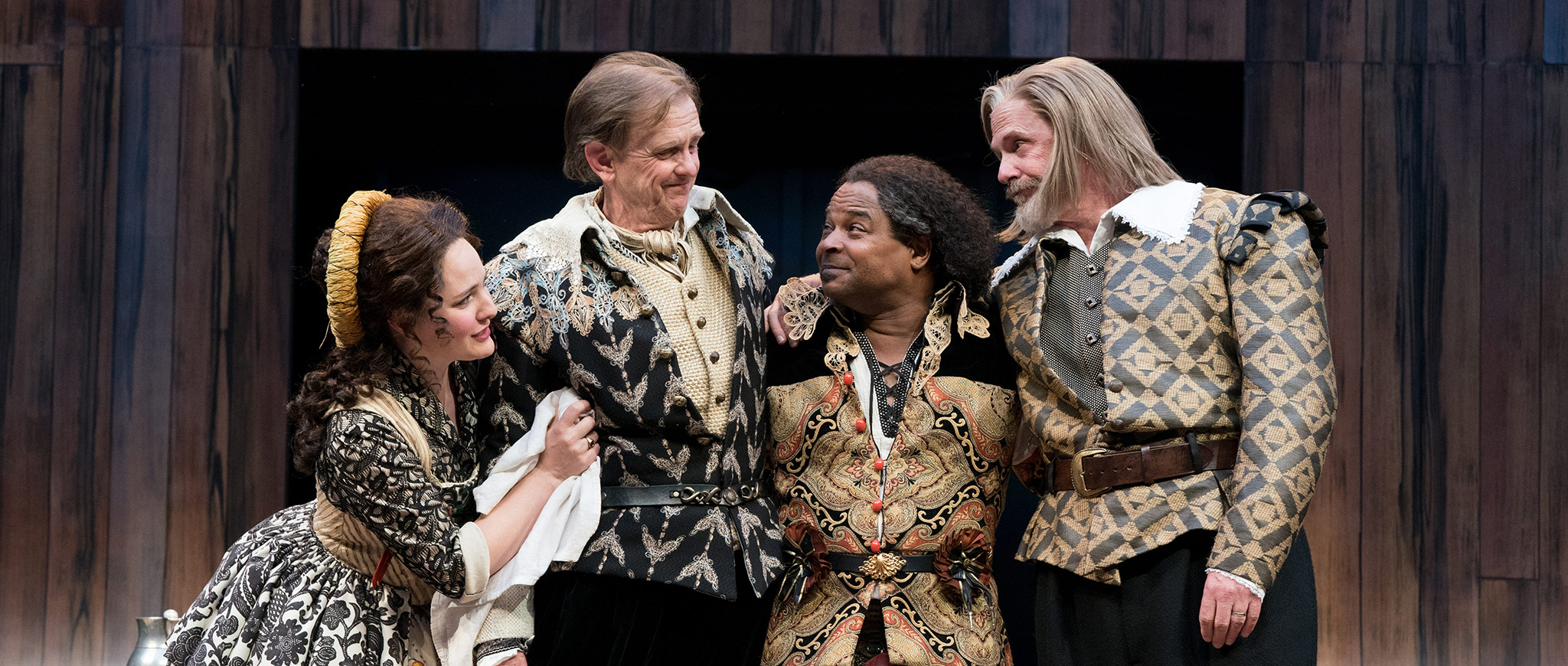 | |
| OSF photo by Jenny Graham |
I really admire Gunderson's work. So do a lot of people, as she is currently the most-produced playwright (other than Shakespeare) in the US. I've seen quite a bit of her work, which makes sense, especially since she is based here in the Bay Area. Some of it is just terrific, though I have a sense that her prolific writing sometimes results in works that don't quite get finished before she moves on to the next project. Still, this one looked super promising.
The Play
It's three years since Shakespeare died, and several of the surviving members of the King's Men are reminiscing about Will and lament the horrible, bastardized versions of his work that are being staged. Richard Burbage, John Heminges, and Henry Condell meet up in Heminges' pub across from the theater (run by John's daughter, Alice). When Burbage dies suddenly, the others realize that he was the only one who knew many of Shakespeare's plays, and they might now be lost forever.So begins a tale of how they decide to gather, edit, and publish the complete works of William Shakespeare into what we now know as the First Folio. It's quite a remarkable historical reconstruction, but it goes way, way beyond that. Deep down it's about the importance of memory and the written word, of passing down stories, of camaraderie, of family, and ultimately of the importance of theater to all of these.
First comes the realization that this sort of thing just isn't done--most work isn't published at all, and writers and theater companies don't own the publication rights. Whoever published the work first owned the publication rights. Second comes the realization that most of the original works no longer exist, and the people who knew them best (Shakespeare and Burbage) are dead.
So they embark on a quest of sorts, to recover prompt sheets, individual character sheets, and even the pirated quarto editions they so despise. It's kind of an impossible task, but they discover it's a labor of love on several levels, and we see the teamwork of the theater, the companionship and support of spouses and children, and even the appreciation of fans and printers.
I found the play remarkably touching, especially the first part of the second act where a lot of reality comes crashing down on John Heminges and he finds his respite and his support group. It's some really terrific writing.
Obviously, being historically based, the folio will eventually get produced, and we get to see the group take the first copy to Shakespeare's widow. And I've left out the bits with his mistress. And I haven't even mentioned the parts with Ben Jonson.
In short, there's a lot to this play, and a lot to like. I was quite taken with the whole package.
The Production
OSF has assembled something of an All-Star team to put this show together. We can start with director Christopher Liam Moore, a veteran actor and director at the festival who has directed some of my favorite shows over the years. Then they cast a group of experienced actors from the company: Kevin Kenerly as Burbage, Jeffrey King as John Heminges, and David Kelly as Henry Condell. Those guys average 22 years of experience in Ashland, so they form a great version of the King's Men. Add a strong supporting cast including Kate Mulligan, Kate Hurster, Catherine Castellanos, Cristofer Jean, and Daniel T. Parker, and all the key roles are covered with a lot of experience and chemistry.The set itself is fairly simple, yet impressive. This is the Elizabethan theater, and the play really doesn't really require elaborate sets, so instead we have a really cool, swooping wood stage floor that extends somewhat over the edge of the actual stage, the curves up and continues upward, pretty much embodying the notion that "all the world's a stage." Then a few tables and chairs and such suggest the pub or a home or the print shop. It was nicely done.
But it's clear from the outset that, like the folio itself, this play is a labor of love for this cast and crew, and it reflects that throughout. Like the book project, you feel like you don't want the play to end, though you want to see the result.
Bottom Line
This might be the best metatheatrical production I've ever seen, if only because it doesn't require a play within a play, yet it's still totally about theater and plays and stories and the bands of artists who create them and keep them alive, and the audiences for whom they are so important. Truly, this is a play that gets all of those elements.I could nitpick about a few things, but overall, I was delighted with this play and this production, and would happily have gone to see it again the next day or the next week if I could. If you love theater, this is a play to tug your heartstrings. And if you don't understand why people like me or the artists love the theater the way we do, this might give you some insight.
Truly, this was one of the transcendent experiences I have come to kind of expect from Ashland periodically. When I see them assemble an astounding group like this, I know it's going to be something special, and this doesn't disappoint.
I can't wait to see this play again, and I'm really disappointed that I don't know when or if I will.
No comments:
Post a Comment